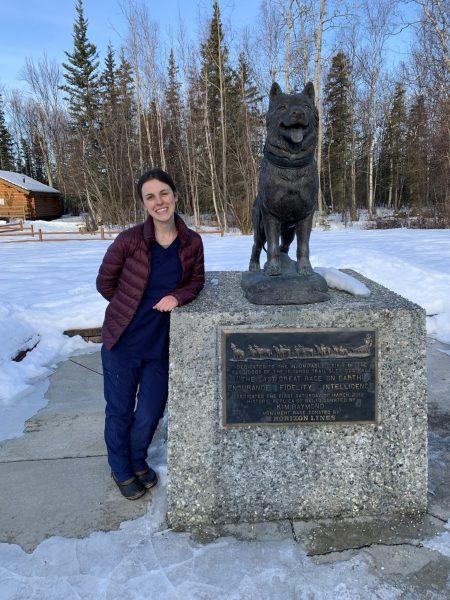-
About
- Leadership & Faculty
- News & Events
-
Academics
- Graduate
- Advanced Clinical Training
- Continuing Education
- Academic Departments
- Academic Offices
- Simulation Experiences
-
Student Life
- Offices
-
Research
-
Hospitals & Clinics
- Emergency Care
- Hospital Services
-
Community Outreach
- Volunteer
Lobbying and Advocating for Animals
Sara Pantel A15 VG21 gains government relations internship with ASPCA

Sara Pantel, A15, VG21 covered thousands of miles gaining a wide range of experience with animals—from treating Alaskan Huskies in the annual Iditarod Trail Sled Dog Race to researching whales and dolphins in Greece to rehabilitating sea turtles at the New England Aquarium. She landed back at Tufts University in the Master of Science in Animals and Public Policy Program (MAPP) at Cummings School of Veterinary Medicine.
Originally from Westchester, New York, Pantel earned a Bachelor of Arts in biology and Spanish from Tufts in 2015.
“I was interested in the sciences, and biology was a good jumping off point for healthcare related fields, including veterinary medicine,” she reasons.
After graduation, Pantel spent two years as a veterinary assistant at the Animal Hospital of Lynnfield, where she helped the veterinarians during appointments and surgeries, worked in the pharmacy, and ran diagnostic tests.
One of the doctors suggested she volunteer as a veterinary assistant at the Iditarod Trail Sled Dog Race, from Anchorage to Nome, Alaska. She helped obtain the dogs’ pre-race bloodwork and ECGs. Pantel found the experience so rewarding that she has returned for the event every year since, sometimes stationed in small towns along the trail.
Pantel continued to explore the field and secured an internship in marine mammal research at the Archipelagos Institute of Marine Conservation in Samos, Greece. She spent three months on boats researching dolphins and whales. She photographed the mammals for identification and monitoring, recorded echolocation sounds, and assisted with marine mammal strandings and necropsies (animal autopsies).
“It was my first exposure to marine conservation. I did a little bit of everything,” she explains.
After returning home, Pantel contemplated veterinary school, enrolled in courses at Northeastern University, and landed an internship at the New England Aquarium in the Rescue and Rehabilitation Department (where she continued to volunteer as a MAPP student). She explained that while traveling south for the winter, sea turtles often get caught in Cape Cod Bay, where the water temperatures drop quickly. Every year sea turtles suffering from hypothermia wash up on the shore.
“We take in the cold-stunned turtles, hoping to release them back in the ocean. We gradually get their temperatures back up, and get them swimming and eating again,” she reports.
Pantel also worked as an in-patient assistant at Angell Animal Medical Center in Boston, caring for dogs and cats in the in-patient wards, honing her veterinary technician skills.
Through all these experiences, Pantel realized she sought more involvement in research, advocacy and policy.
“I had known about the MAPP program and finally felt like it was the right time to do it,” she acknowledges.
She started in the research track of the MAPP program in fall 2020.
“I liked the practical courses to gain skills like research methods and statistics, and the content-based courses, like ‘Animals and Society,’ surveying the different issues involving animals and specifically human-animal interactions,” she says. “The faculty were incredible.”
For her capstone project, Pantel interviewed dairy farmers about the effects of the pandemic.
“The pandemic has impacted animal welfare differently for different types of animals,” she insists. One positive, she explained, is growing interest in increasing access to telemedical services for companion animals and farm animals. Also, people are becoming more aware of the mental health benefits of companion pets and of where food comes from.
After graduating in December, Pantel began work as a government relations intern at the American Society for the Prevention of Cruelty to Animals (ASPCA), focusing on lobbying and advocacy.
“I’m loving it,” she admits. “It’s totally different from anything I’ve done before.”
Most recently, she worked on lobbying efforts in support of the Save America’s Forgotten Equines (SAFE) Act, which would ban the slaughter of horses.
“I use skills I learned in the MAPP program, like communicating policy positions to different stakeholders—it was a natural progression from the program into this role,” Pantel concludes. The MAPP program was phenomenal. I found a passion for animal welfare through the program, specifically animals in human care.”
Have a passion for understanding human-animal relationships and promoting the status of animals in society?
Learn more and apply to the MS in Animals and Public Policy (MAPP) program.
This unique one-year graduate degree program offers students the opportunity to explore the complex relationships between people and animals, and how those relationships are reflected in our culture, institutions, and public policy.
While students enter the program with different interests, skills, philosophies, and aspirations, all share a passion for understanding human-animal relationships and promoting the status of animals in society. MAPP graduates successfully pursue careers in policymaking, law enforcement, advocacy, public education, research, animal shelter management, and applied animal behavior. MAPP graduates also have outstanding success obtaining advanced training in Ph.D. programs, law, and veterinary medicine.
Department:
M.S. in Animals and Public Policy